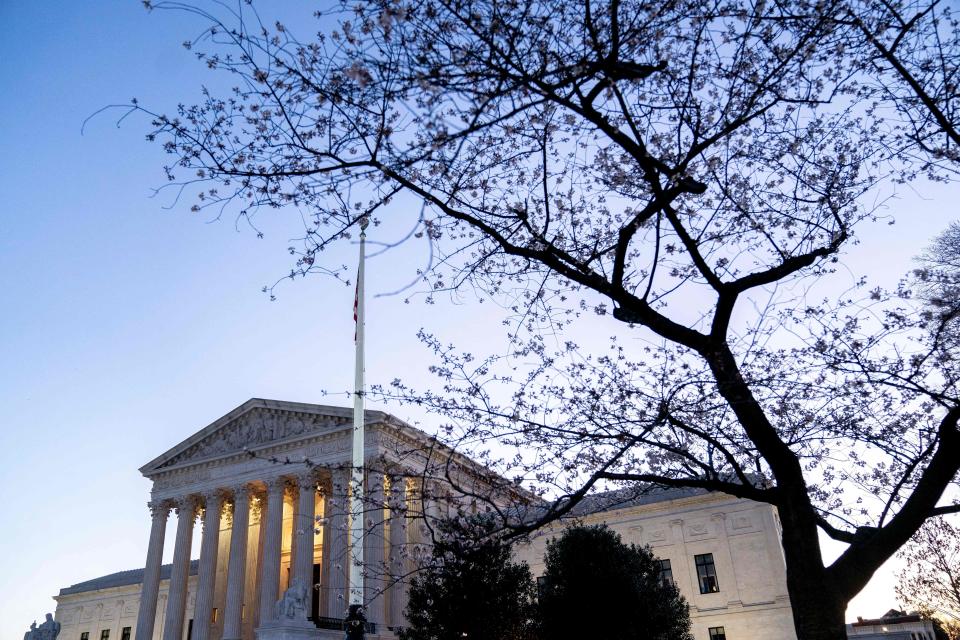In voting rights case, Supreme Court evaluates who should represent North Carolina in federal court
- Oops!Something went wrong.Please try again later.
- Oops!Something went wrong.Please try again later.
- Oops!Something went wrong.Please try again later.
- Oops!Something went wrong.Please try again later.
WASHINGTON – Who represents a state?
That’s the question the Supreme Court grappled with Monday in a case about whether Republican North Carolina lawmakers should be able to help the Democratic attorney general defend a contentious voting law in federal court.
The case could set a new framework for who represents the state when a law is challenged in federal court while the legislative and executive branches are controlled by different parties.
Several justices sounded reluctant to prevent the lawmakers from lending a hand. Chief Justice John Roberts said it would be tough for federal judges to pick who gets to argue the different sides in highly political cases, such as this one involving voting rights.
“That’s a pretty difficult, eyebrow-raising thing for a federal court to do, when you have a political controversy with two different entities, each one having the right to intervene under state law,” Roberts said. “I don’t see federal courts doing that as a general matter. If we do ask them to do that, that’s putting them in an intensely political position.”

The case is one of several in which somebody sought to intervene in the challenge of a controversial law or policy. Other cases involved a Kentucky ban on an abortion procedure and a Trump administration policy to deny permanent residency to immigrants who receive benefits such as rental assistance or food stamps.
The 2018 North Carolina law at stake deals with voting regulations, which enacted an identification requirement, expanded the number of partisan poll observers and expanded grounds to challenge a voter’s ballot.
Democratic Gov. Roy Cooper vetoed the bill, but the Republican-led Legislature overrode his veto. The Supreme Court case involves Republican legislative leaders – Sen. Philip Berger and House Speaker Timothy Moore – arguing they should be allowed to help defend the law because of suspicions Cooper and Democratic Attorney General Josh Stein wouldn’t defend it effectively.
David Thompson, a lawyer for the lawmakers, said they have an interest in simply defending the law, while the executive branch must also consider how it will be administered. Thompson noted that Cooper called the law “unconstitutional” and said it “should never go into effect.”
“Gov. Cooper has been an implacable foe of this law,” Thompson said. “He would not be an adequate representative.”
The lawmakers claim a North Carolina law designates legislative leaders to defend laws in certain cases. When a state law is challenged in federal court, the statute calls for “both the legislative branch and the executive branch of the State of North Carolina to participate in any such action as a party.”
More: NC is ‘Ground zero’ in 2020 election: Breaking down state's top races
Associate Justice Sonia Sotomayor asked how the legislative and executive interest in law were different. Associate Justice Elena Kagan asked whether opening the door to two lawmakers could also open the door to all 170 in the state.
“Doesn’t the executive branch represent the state writ large?” Kagan asked.
The North Carolina Conference of the NAACP sued the state to halt enforcement of the law. The NAACP argued the law discriminated against Black and Latino voters in violation of the Voting Rights Act and the 14th and 15th amendments to the Constitution.
But the Supreme Court case isn’t about the NAACP claims or the merits of the case, just about who will be arguing on behalf of the state.
Associate Justice Samuel Alito asked what lawmakers should do if the attorney general assigned a junior lawyer to the case or declined to spend money on the case.
“What if at some point, the attorney general says, ‘Look, this is costing too much, we should settle,’” Alito said.
Elisabeth Theodore, a lawyer representing the NAACP, opposed allowing the lawmakers to intervene because the attorney general is already defending the case – and is winning in early skirmishes. She said allowing lawmakers to intervene would complicate lawsuits and raise costs substantially.
“This case is the poster child for why federal law puts a thumb on the scale against intervention,” Theodore said. “There is just no need for intervention here."
More: Biden has aggressively protected voting rights, but experts warn it's not enough
Sarah Boyce, deputy attorney general for North Carolina, said her office was defending the law vigorously. She said that if the court rules that lawmakers can join the case, it should be after a court decision rather than happen automatically.
“Petitioners have identified no daylight between their legal position and ours,” Boyce said. “Their evidence is duplicative with our evidence. And we have prevailed in litigation thus far, and are confident we will ultimately prevail through final judgment.”
The high court is expected to rule on the case by June.
This article originally appeared on USA TODAY: Supreme Court weighs who should represent North Carolina in case

